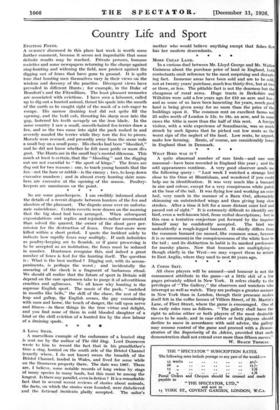Country Life and Sport
EVICTING FOXES.
A SUBJECT discussed in this place last week is worth some further comment, because it seems not improbable that some definite results may be reached. Private persons, humane societies and some newspapers returning to the charge against stag-hunting and widening the field, now protest against the digging out of foxes that have gone to ground. It is quite true that hunting men themselves vary in their views on the wisdom and decency of the practice. Divergent views have prevailed in different Hunts ; for example, in the Duke of Beaufort's and the Fitzwilliam. The least pleasant memories are associated with evictions. I have seen a labourer, called up to dig out a hunted animal, thrust his spade into the mouth of the earth as he caught sight of the mask of a cub eager to escape. His narrow draining tool did not quite fill the opening, and the bold cub, thrusting his sharp nose into the 'gap, fastened his teeth savagely on the iron blade. In the same country I saw a small, smooth-haired fox-terrier draw a fox, and as the two came into sight the pack rushed in and severely mauled the terrier while they tore the fox to pieces. Morsels were rescued, and presently away from the scene rode a small boy on a small pony. His cheeks had been "bloodied," and he did not know whether he felt more pride or more di'. gust. The Hunts are in the small boy's mental dilemma. This much at least is certain, that the " blooding " and the digging out are not essential to " the sport of kings." The foxes are dug out for two reasons : one, to teach young hounds that the fox--not the hare or rabbit—is the enemy ; two, to keep down excessive numbers ; and in almost every hunting shire num- bers are excessive at the opening of the season. Poultry- keepers are unanimous on the point.














































 Previous page
Previous page